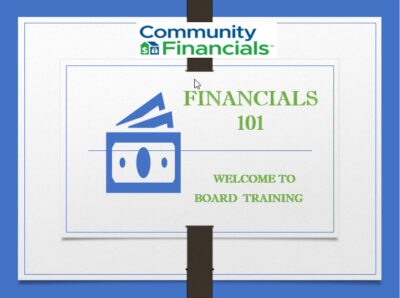A week ago we held a webinar on how to read financial reports for your HOA or Condo community. In case you missed it we are providing a link to the recording as well as some of the questions and answers below. Stay tuned as we’ll offer other educational webinars like this more frequently in the coming year.
We covered what reports to look at if you have limited time and what items to look for. Our goal was to make looking at your financial reports easier, feel less overwhelming, and take less time on a monthly basis.
Click here to watch the video
Here are some of the questions that attendees asked and our responses:
Q: What are the mechanics and benefits of accrual basis versus cash basis accounting methods?
A: Here is a link to our blog post on this subject.
Q: How do you decide what financials to show in homeowner meetings and to what extent can we summarize or simplify the statements from their original form for easy presentation in meetings?
A: Typically, the homeowners are shown the comparative income and expense report (showing the budget) and YTD figures as well as the balance sheet so they can see what money the association has in reserves, etc. Note that in no circumstance do you discuss or provide aged delinquency information with the owners.
Q: To what extent can we summarize or simplify the statements from their original form for easy presentation in meetings?
A: For easy meeting presentation I would recommend showing the balance sheet and budget comparison, or creating a summary form that can be filled out with key information.
Q: We process Reserve projects through the Reserve account; is there a report that shows the yearly reserve expenses?
A: The yearly reserve expenses can be found at the bottom of the Budget Comparison/Income Statement under Reserve Expenses in the Actual YTD column. You can also request a GL Detail Report for your reserve accounts.
Q: How can the reserve study best be incorporated into capital expenditures?
A: For budgeting purposes, you can get quotes prior to engagement in a reserve study and you can review your By-Laws to determine how often a Reserve Study must be done if required. To incorporate your reserve study findings into your annual budget you would review the recommendations for amount of annual reserve contributions needed to cover selected capital expenditures.
Q: We process Reserve projects through the Reserve account; is there a report that shows the yearly reserve expenses?
A: The yearly reserve expenses can be found at the bottom of the Budget Comparison/Income Statement under Reserve Expenses in the Actual YTD column. You can also request a GL Detail Report for your reserve accounts
Q: I receive most of these reports as a board member, however, our CAM refuses to share some of those that you presented with the entire board; they state there are salaries that cannot be shared; they are only shared with the President and Finance directors. Should I be concerned?A: This seems odd. This type of information is routinely shared with all Board Members in executive session at board meetings (not open to homeowners). The Board has a right to know the details of all its expenses so it can have discussion on how it is using its resources for the benefit of all owners. You can’t do that if some of the information is not provided.
If you liked this you may also like our page on the Best 4 Financial Reports for your HOA or Condo Community
Get Your HOA Accounting Taken Care of by the Experts
Request a Quote Now!
